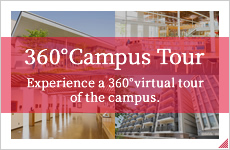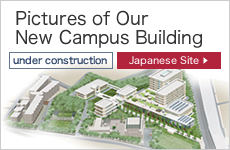The International College of Arts and Sciences

Faculty Outline/Principles
![]()
There is a strong need to produce talented people who will combine a global vision with the cultured manners of the future generation in order to solve the problems of present-day society. Therefore, FWU was restructured into one faculty with three departments, with great importance being attached to "international" and "culture". Practical education with a strong emphasis on independently expanding students' learning horizons will take place at the faculties set up in the International College of Arts and Sciences, focusing on "international", "environment" and "food and health", and this will lead to the internationalization of our campus. In addition, through integrated education, students can develop various viewpoints and critical thinking skills by studying a wide range of subjects, including both basic core subjects in each faculty and special subjects from other departments.
FWU COMPASS

FWU COMPASS indicates the purpose, system, and methods of our undergraduate education based on the signi?cance of establishing the International College of Arts and Sciences. "Developing people who can change the world" is a condensed expression of the College's educational philosophy.
"People = humanity" is supported by the "World = international-mindedness" and "Change = independence". At the center of our education is the philosophy and method of "interdisciplinary education".
People (Humanity)
“Kansei” Education
Our students are able to cultivate their intelligence and sensibility through studying languages, history, culture, environmental science, literature, international relations, food science, arts, the human mind, leadership, and humanities in theory and practice, provided by our "Kansei" program. With the improvement of intelligence, sensibility, creativity and expressiveness, our students experience a revolution of thinking and behavior.
Integrated Arts and Science Education
We provide our students with creative and diverse learning opportunities transcending traditional disciplinary boundaries by integrating a wide range of disciplines in the arts and science. It enables our students to opt for minor subjects in addition to major subjects. Under our flexible educational framework, they are able to gain expertise in multiple fields of study and the ability to think in a pluralistic and integrated manner.
Traditional and history
FWU's educational policy has been constantly evolving since the establishment of the university in 1923. Our distinctive education has been producing graduates who contribute to society, act as a catalyst in the present world, and create value that can be passed on to the next generation. We will celebrate our centennial anniversary in 2023 and are very proud of the contribution and achievements of our13,000 plus graduates over the last 100 years.
Change (Independence)
Experiential Learning
FWU is organizing various experiential learning programs on- and off-campus. These learning programs are designed to provide our students with a more hands-on approach to learning that enhances practical skills and can help to resolve various practical issues related to their own lives and the lives of others, as well as local, national and international society.
Quarter System
The quarter system improves learning efficiency through an intensive twice-per-week teaching format. It can increase the flexibility of the academic calendar and encourages students to study abroad or participate in an internship program during one quarter.
Small Class Sizes
Most of our classes are small-sized. Focusing on the benefit of small classes, we provide our students with a productive learning environment that deepens learning based on a mutual understanding between teachers and students. Students are able to develop practical communication skills and skills to proactively resolve various issues through discussion with a teacher, group discussion, and delivering presentations. In addition, students'learning is supported by a first-year seminar, an academic advisor system, and learning portfolio that is used to visualize and monitor each student's individual learning outcomes.
World (International-mindedness)
Study Abroad Experience
We provide our students with a wide range of long- and short-term study abroad programs in collaboration with overseas partners aimed at developing a students'global awareness. About 80% of our students participate in such programs prior to their graduation.
Communication in a Foreign Language
The Academic English Program, the English Village Program, a shared dormitory for international and Japanese students, and other programs are offered to develop international communication skills and competence amongst all of our students.
Education in the Dormitory
All FWU students live on campus for their first year, while students from overseas stay in residence for four years. This arrangement allows our students to enjoy the opportunities to communicate in foreign languages and exposes them to diverse values and ways of thinking. Living in the dormitory provides a valuable educational experience to our students that develops their independence and ability to form strong relationships with other dormitory residents, as well as cultivating cross-cultural understanding.



